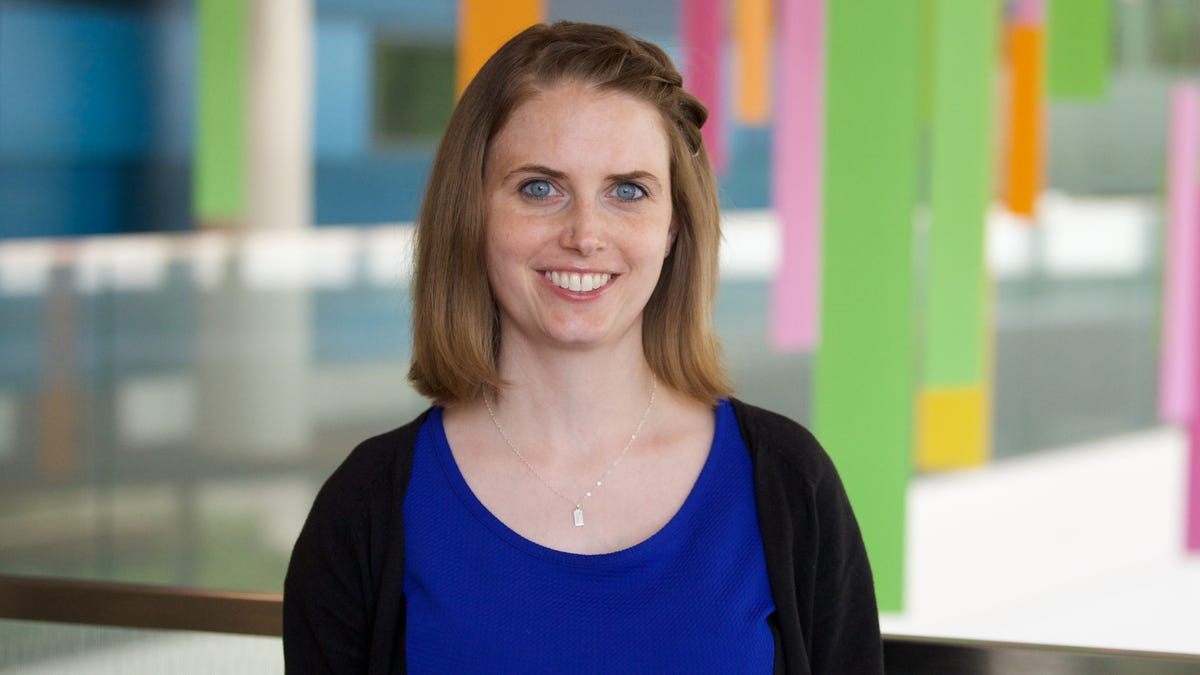Today, I’m excited to bring back a feature from before the COVID-19 pandemic called Healthy Actions.
In the monthly series, which started in 2018, I pick topics of wide interest to educate readers who might not otherwise have access to our area health experts.
The series continued in 2019 and a bit of 2020 before the pandemic took over my time.
New this time, we will usually have a Now You Know Akron podcast available so you can hear the interview. Look for occasional videos accompanying the columns on BeaconJournal.com as well.
Today’s topic is about youth and sports with Akron Children’s Hospital’s new sports psychologist, Allyson Weldon. Weldon grew up in Parma and played soccer in high school and at Ursuline College. She then got her PhD at the University of Houston and came back to Northeast Ohio for her internship and her job.
Q: What does a sports psychologist do and who might come see you?
A: A sports psychologist is not too much different than your general psychologist.An athlete may come and see me if they had an injury and had significant lost time that is causing a lot of anxiety or stress and they’re having troubles with returning.
I also see concussion patients since a lot of things can go haywire with a concussion, including emotion regulation.
Not everyone is clinically meeting a major depressive disorder or generalized anxiety disorder diagnosis, but things are going on that are causing some challenges. I also have patients that come see me just because they’re having some mental blocks (with a skill they used to be able to do).
I also see athletes who want to move on to the next level. While sports are very physical, they are sometimes equally, if not more mental.
Q: Do patients need a referral?
A: No, though I get a lot of referrals from sports medicine,orthopedics, sports rehab and pediatricians. Parents can call 330-543-8260.
Q: What age range are your patients?
A: The majority are teens, around 12 to 18 years old. I do have a couple of college-age kids and I will see up through 22. My youngest patient is 9; my comfort level would be no younger than 7.
Q: There is more awareness about mental health and sports after Simone Biles withdrew from some Olympic events. Has something changed or are people more open to talking about their challenges/ Has the pandemic affected that?
A: There has been a shift in society of being more open and willing to accept mental health as a real thing and the pandemic has honestly helped with that. The more high-profile athletes we have coming out, sharing about some of the struggles they’ve experienced and needing services, helps. More professional teams have access to professional psychologists, so that makes it more acceptable for others.
Two years into pandemic, how are kids doing? Here’s what some Akron parents had to say
Q: A lot of kids, especially when they are young, dream of being a professional athlete or earning a college scholarship. Can you talk to me about the pressures from the athletes themselves and from parents, along with early burnout and injuries they can’t control?
A: Injuries and the burnout is something happening much more frequently because sports have shifted to being an all-year option. Unfortunately, this whole sports specialization that we’re focusing on is really one of the biggest challenges that I’m seeing a lot with my younger patients. They’re losing interest and I think that pressure takes away the fun of sports and really that’s what sports are meant to be.
Nearly every athlete at some point experiences some injury, hopefully only minor. Plenty face major injuries. Our developing bodies aren’t ready for the amount of impact from some of these sports. That then takes the mental toll because they’re losing time. For athletes hoping for a Division 1 college scholarship and beyond, they could be watched from eighth or ninth grade, so if an injury happens early, they feel that they’re not going to get that scholarship.
A lot is just overuse. Our bodies need time off and we’re not allowing that to happen.
Q: Kids don’t want to hear “take time off.” What tips do you have for coping?
A: It’s a lot of trying to figure out mentally, how can we accept that time off is needed. I relate it to school and how we have breaks in school — and we really enjoy those breaks.
That’s also sometimes how I spin injuries for my athletes. This is a much-needed rest and rehab.
Q: What about parents? Sometimes the parents are pushing the athlete to keep going or reliving their childhood through their athlete.
A: I talk to them about with psychoeducation on the mental toll it’s taking on their child and how if they really do want them to get to that level and the child athlete also wants to get to that level, they need to allow that space so they can mentally and physically recoup.
You’re right, parents don’t want to hear that. But parents want what is best for their child, so I use their words to shift it and say, “What is it your child needs right now?” That generally helps them see it a little differently.
Q: No one plans for an injury and it is such a blow to the athlete. How does this affect an athlete’s mental health?
A: Confidence definitely takes a blow. Some athletes will come in and see it as the much-needed break, but most don’t. They’re devastated. They feel a loss of identity and feel their team is going to move on without them or they’re not going to be needed when they come back. Sometimes there’s also that fear of going back to the sport because they may get reinjured or a new injury.
Some like to isolate and pull away, which we want to avoid. We want to keep them involved with their team as much as possible when ready and not force them to go the day after the injury if they’re not ready. After a week or two, ask: “How can we start getting you back in? What game do you want to go watch or what practice do you want to go attend?” The more that they can be a part of that team, the more their team will then still view them as a friend and the more the coach still sees them.
Q: How do you help an athlete who has to leave a sport due to an injury?
A: It’s a really hard process because we consider that like forced retirement, even if there are 14 years old. It’s really hard when it’s not a choice. It’s hard even when it is a choice.
It’s really working on shifting that identity. The goal of sports is fun, but it is to help build that active lifestyle for the future. How can you redefine yourself? Maybe it’s another sport or if there’s some physical limitations, something like yoga.
However, this is still a loss and they may go through the same stages of grief as mourning a loved one. Helping them process those emotions and normalizing it is important. Sometimes people say “you shouldn’t feel that way and you had a great career.” But their emotions are real and we have to validate them and help them through that grief process, which is different for every person.
Q: This is the end of the school year and there are a lot of seniors finishing their last season. What tips do you have for the athletes, as well parents, with the finality of it?
A: For the athlete, it’s definitely easier for them to find other things to fill their time with at college. Do you want to do intramurals or club sports? Or there are also a lot of community-based teams and leagues.
From the parent side, it’s really hard. It is a huge loss when you go from spending every weekend watching your child play and then that’s gone. Maybe they can find things they enjoy doing and revamping their own perception of themselves and their child and not mourning the loss, but celebrating what they did get to experience.
Q: Do you give your athletes mindfulness tips to prepare for a game?
A: I am really big on doing a lot of positive mental imagery, especially with my more anxious kids that are more fearful of returning to certain things. Visualizing themselves performing that particular skill or performing that well. That helps to reduce that anxiety. Deep breathing exercises are also helpful.
Sometimes it’s also not focusing on the routine they do before the game because I think a lot of athletes do things like, “I put this shoe on first and then this one and we won the game. So now I have to do that every time.” Then each time they win, it adds a little something more. Before you know it, their pregame routine is like an hour and it’s like, “OK, we don’t need to do all of that.” Let’s take a step back and I challenge themselves outside of that comfort zone so they see that’s not something we need to rely on. It’s not what made you score that game-winning goal.
Q: How can athletes balance school and sports?
A: That is something that is very stressful to a lot of my high-school athletes, especially my overachieving students who take all AP (Advanced Placement) classes or all honors classes.
If it’s game days, you could be getting home at like 10 o’clock at night some days and you still have to eat dinner and shower and do your homework. That’s a big challenge. They need to create structure for themselves. If you have a study hall, making sure to use that time wisely. See if you can study on the bus or at the field if you are a varsity player and you need to be watching the JV game. It’s not ideal, but you could do both.
For some of them, you don’t have to get straight A’s. I don’t want to say grades don’t matter because they are important. You don’t have to get an A on every single thing you do as long as your overall grade is an A, if that’s what you’re striving for, that’s fine.
To read previous topics in the Healthy Actions series, go to www.tinyurl.com/BettyHealthyActions Beacon Journal staff reporter Betty Lin-Fisher can be reached at 330-996-3724 or [email protected]. Follow her @blinfisherABJ on Twitter or www.facebook.com/BettyLinFisherABJ To see her most recent stories and columns, go to www.tinyurl.com/bettylinfisher














